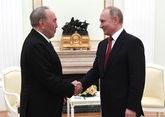This year marks five years since the treaty establishing the Eurasian Economic Union was signed and 25 years of the Eurasian integration idea, first expressed by President of Kazakhstan Nursultan Nazarbayev in 1994. During the '25 years of Eurasian Integration: from an idea to a sustainable union' conference, PR manager and journalist Yerzhan Yensebay once again recalled that barriers and restrictions on the free movement of goods, services, capital and labor within the Union countries were removed thanks to the EEU, while Nazarbayev's initiative promoted the dynamic development of economies and significantly strengthened cooperation between the EEU member countries.
Yerzhan Yensebay deemed it necessary to recall the chronology of Eurasian integration: "In the 1990s, Nazarbayev voiced the idea of forming a Eurasian Union. Speaking at the Royal Institute of International Affairs in the UK on March 22, 1994, he said: "It should be understood that the CIS is not a state, not a national entity, but a mechanism of regional interaction that has developed in natural conditions." That is, the alliance mechanism was important for the CIS countries. On March 29, 1994, a week after speaking at the Royal Institute of International Affairs, President Nursultan Abishevich put forward the idea of forming a new integration association - the Eurasian Union - at a meeting with the Lomonosov Moscow State University faculty during his visit to Russia. On October 27, 2011, he wrote in the article 'Eurasian Union: from idea to future history': "In March 1994 I first suggested to create in the CIS countries a new integration Association — the Eurasian Union of States. This idea was not accidentally released by me in the academic audience at Moscow State University. I directly addressed the intellectual elite of the Commonwealth with firm determination to bring forward the process of multilateral integration, in which he was already two years after the formation of the CIS. I frankly said that the CIS does not meet the objective requirements of the time and does not ensure the integration of the member countries, which our peoples need so badly. Therefore, there is a need to create a new interstate association, which would act on clearer principles"...
At the same time, it was stated that no old union would be recreated, no empire would come. The head of Kazakhstan proposed the creation of a Eurasian Economic Union on the principles of economic pragmatism. That is, working within the framework of the Union was now profitable for the participating countries. Methods of economic pragmatism have borne fruits in the industry, in particular, there has been a significant increase in mechanical engineering, metallurgy, automotive, metal products, furniture industry. Within the framework of the union, the working capital of trade enterprises increased. This format allowed to reveal Kazakhstan's growth prospects in the integration processes in the post-Soviet space."

Yerzhan Yensebay said that such structures as the Central Asian Union, the Customs Union, the Union State of Russia and Belarus were being formed at that time. These steps allowed the heads of state to establish the Eurasian Economic Community (EEU) on December 10, 2000, in Astana, an international organization with a clear functional structure, an effective mechanism of work, clear and understandable goals in the form of a customs union, a single economic space and integration into the world trade and economic system. On May 29, 2014, the Treaty on the Eurasian Economic Union was signed. On December 4, 2014, the Armenian parliament ratified the agreement on the country's accession to the EEU. On December 23, an agreement was signed on the accession of Kazakhstan to the EEU at a meeting of the Supreme Eurasian Economic Council. On January 1, 2015, the Treaty on the Establishment of the EEU entered into force. On January 2, 2015, Armenia officially joined the EEU, the procedure for Kazakhstan’s accession to the EEU was completed in August 2015. Thus, Nursultan Nazarbayev's Eurasian idea theoretically and practically developed in the last 25 years in accordance with the requirements of the time, laying the strategic foundations of economic integration for many decades to come."

Head of the Rukhaniyat communal state institution under the Akimat of Astana, which was renamed to Nur-Sultan, Dauletkhan Zhienkulov said that after the EEU was established, Kazakhstan’s GDP grew by 1.2% in 2015, by 1.1% in 2016, by 4% in 2017, by 4% last year: "These statistics show the achievements of the EEU. The geographical location of Kazakhstan obliges it to become a "golden bridge" between Asia and Europe. New President Kassym-Zhomart Tokayev, a professional diplomat, worked with China, with Europe, at the UN, therefore, integration processes will continue not only within the EEU, our international integration will drastically intensify."

The journalist of BAQ.kz, Kymbat Yeltai, found it necessary to remind that "on March 21 of this year, Nursultan Nazarbayev and Kassym-Jomart Tokayev held a telephone conversation with Russian President Vladimir Putin. During the conversation, Vladimir Putin thanked Nursultan Nazarbayev for his personal contribution to the development of allied bilateral relations, and noted his historical role in the success of the Eurasian integration project. The Russian leader expressed confidence that the first President of Kazakhstan would continue to actively contribute to the efforts to strengthen cooperation within the framework of the Eurasian Economic Union. The heads of state agreed to work closely in order to further enhance constructive Kazakh-Russian cooperation in all areas, as well as work together to resolve topical issues on the international agenda."
"We also know from media reports that Vladimir Putin invited President of Kazakhstan Kasym-Zhomart Tokayev to visit Russia in the near future. Our Russian colleagues write that Nursultan Nazarbayev has always been a true friend of Russia and showed his friendly feelings towards the neighboring state. About Kazakhstan being an important ally of Russia, and new president of Kazakhstan Kasym-Zhomart Tokayev being a brilliant well-educated intelligent politician. Russian colleagues also hope that cooperation between Kazakhstan and Russia will further strengthen. And we also look forward to further fruitful cooperation," Kymbat Yeltai said.










